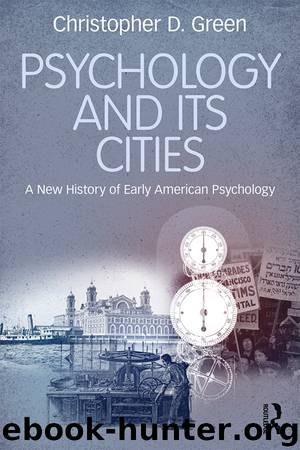Psychology and Its Cities by Christopher D. Green

Author:Christopher D. Green
Language: eng
Format: epub
Publisher: Taylor & Francis (CAM)
Published: 2018-07-22T16:00:00+00:00
7
The Formation of Psychology’s “Schools”
1. A Constellation of American Psychologists Takes Shape
At the start of 1887, there were exactly two experimental psychology laboratories in all of North America—Harvard and Johns Hopkins. Just eight years later, at the end of 1894, the year that Dewey arrived in Chicago, there were 28.1 This extraordinary explosion in the number of psychology laboratories was the product of some talented and ambitious individuals, to be sure, but also of a radical change in the way Americans began to view colleges—from a small exclusive clubs to mass public institutions.
After Harvard and Hopkins, the third laboratory was founded at the University of Pennsylvania in 1887. It was set up by James McKeen Cattell, the one-time student of Hall at Hopkins and of Wundt in Leipzig (PhD 1886). Cattell was just then embarking on his invention of “mental tests.” The fourth American psychology laboratory was established at Indiana University in 1888 by William Bryan.2 Bryan had studied with the famed memory researcher Hermann Ebbinghaus in Berlin, but he earned his PhD under Hall at Clark. He later became president of his university. The fifth was Jastrow’s laboratory at Wisconsin in 1888, and the sixth was Edmund C. Sanford’s at Clark in 1889. The seventh psychology laboratory in North America was not in a university at all, but at the McLean Asylum outside of Boston, set up by William Noyes, a Harvard-trained physician who had undertaken some post-graduate research training with Hall. The eighth, ninth, and tenth were, respectively, at the University of Nebraska, founded by a former student of Wundt named Harry Kirke Wolfe (1889); at the University of Michigan, set up by Dewey’s junior colleague, James Hayden Tufts (1890); and at the University of Iowa (1890), established by George T. W. Patrick who had been a student of Hall’s at Hopkins.3
After the first ten laboratories were in place, new ones came in bunches: Columbia (Cattell) and Toronto (Baldwin) in 1890; Cornell (Frank Angell) and Wellesley (M. W. Calkins) in 1891; Brown (E. B. Delabarre), Illinois (W. O. Krohn), Kansas (O. Templin), Catholic University (E. A. Pace), New Jersey State Normal School in Trenton (L. A. Williams), Yale (E. W. Scripture) and Chicago (C. A. Strong), all in 1892; then Princeton (J. M. Baldwin), Minnesota (J. R. Angell), and Stanford (F. Angell) in 1893.
There are many interesting stories buried within this list: (1) Cattell moved to Columbia in 1890, opening the first psychology lab in New York City. (2) James Mark Baldwin moved north, to Toronto, to found the first permanent psychology laboratory not only in Canada, but in the British Empire as a whole.4 (3) There were three individuals who opened labs in two different places (Cattell, Baldwin, and Frank Angell). (4) There are two women on this list—Mary Whiton Calkins at Wellesley, who would go on to serve as president of both the American Psychological Association (1905) and the American Philosophical Association (1918–1919), and Lillie A. Williams at New Jersey State Normal, who served as one of Hall’s most inveterate collectors of questionnaire data.
Download
This site does not store any files on its server. We only index and link to content provided by other sites. Please contact the content providers to delete copyright contents if any and email us, we'll remove relevant links or contents immediately.
The Secret Power of Speaking God's Word by Joyce Meyer(3227)
Signature in the Cell: DNA and the Evidence for Intelligent Design by Stephen C. Meyer(3140)
Real Sex by Lauren F. Winner(3025)
The Holy Spirit by Billy Graham(2954)
The Gnostic Gospels by Pagels Elaine(2534)
Jesus by Paul Johnson(2363)
Devil, The by Almond Philip C(2334)
23:27 by H. L. Roberts(2252)
The Nativity by Geza Vermes(2233)
Chosen by God by R. C. Sproul(2165)
All Things New by John Eldredge(2165)
Angels of God: The Bible, the Church and the Heavenly Hosts by Mike Aquilina(1969)
The Return of the Gods by Erich von Daniken(1946)
Angels by Billy Graham(1927)
Knowing God by J.I. Packer(1860)
Jesus of Nazareth by Joseph Ratzinger(1812)
The Gnostic Gospel of St. Thomas by Tau Malachi(1799)
Evidence of the Afterlife by Jeffrey Long(1792)
How To Be Born Again by Billy Graham(1784)
